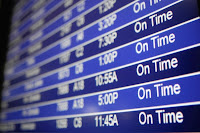The high cost of a dream cruise vacation can leave you feeling a little queasy before you even set sail. (And let's not mention the add-ons!) Here, our Trip Coach's sage advice about how to save big before boarding.
BOOK EARLY
By reserving six to 12 months ahead of your cruise, you can lock in an early-bird rate that's 25 to 50 percent lower than the published "brochure" rate most lines advertise. You'll also have a wider selection of itineraries, dates, and cabins, and possibly get better deals on airfare and hotels. If prices go down after you book, a good travel agent—or the cruise line itself—should help you get the new lower rate.OR BOOK LATE
Yes, it runs completely counter to what we just said about booking early, but if you wait 60 to 90 days before you want to sail, cruise lines often drop prices significantly to fill any remaining spaces on their ships. If you're willing and able to white-knuckle it, this is when you can nab a weeklong Caribbean cruise for under $500. But of course, you won't have as much choice of itinerary or cabin, it may be tricky to find a low airfare to your port, and last-minute fares are typically nonrefundable.REQUEST A DISCOUNT
Asking the right questions can work magic. If you're a return customer, mention it when booking and politely inquire whether you're eligible for a discount—it can shave 5 to 15 percent off your fare. Since cruise prices are based on double occupancy, a third or fourth person in your cabin should get a 30 to 60 percent discount. If you're 55 or older, don't be shy about asking for a 5 percent discount; likewise, active and retired servicemen and women should always ask if the line offers them savings.USE A TRAVEL AGENT (like Nonstop Travel!)
Sites like Kayak and Expedia have put you in the driver's seat—sometimes literally—but don't underestimate the role a good agent can play in finding you the right deal. Many have reserved spaces they can sell you at a discount, and they can explain whether an advertised "free" upgrade or all-inclusive package is for real or just a ploy. They can also advocate for you if rates drop after you've booked your cruise.GO BIG
Large groups—like family reunions at sea—can be complicated to pull together, but they can also knock big bucks off the price of cabins. A group of 16 people in eight cabins, for instance, can sometimes get a steep discount on the 16th fare, or in some cases a free berth. For large groups, booking a year in advance is advised to ensure you get the block of cabins you want.TRY SHOULDER SEASON
You won't save a ton, but sailing when most folks stay home can nab you a modest bargain—maybe 10 percent off typical high-season rates. Here are the best times to find deals in four highly popular cruise regions:- Caribbean. September and October, the non-holiday weeks in December, and early January to Presidents' Day.
- Europe. Mid-March and April, September to December
- Alaska. May and September
- Bermuda. April and October
UNDERSTAND THE EXTRAS
The end of a beautiful cruise can be stunning in all the wrong ways—if the bill tacks on a bunch of extras you weren't prepared for. Ask in advance what activities, food, drinks, and sundries are included in your fare and which will cost more. In general, be ready to pay the following:
- $2+ for a can of soda
- $3+ for a latte
- $5+ for a mixed drink
- $10+ for a photo shot by cruise staff
- $20+ for a bottle of wine
- $10 to $75 per person for alternative dining
- $10 to $15 per person per day gratuities









